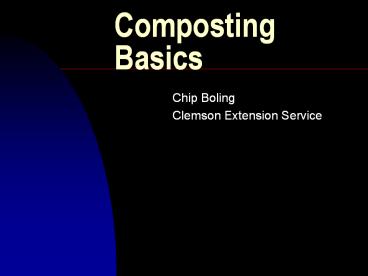Composting Basics - PowerPoint PPT Presentation
1 / 19
Title:
Composting Basics
Description:
Supplies plant with essential plant nutrients-not a substitute for fertilizer ... Doesn't heat up under otherwise good composting conditions. pH is 7.0-9.0 ... – PowerPoint PPT presentation
Number of Views:314
Avg rating:3.0/5.0
Title: Composting Basics
1
Composting Basics
- Chip Boling
- Clemson Extension Service
2
What is Composting
- Composting is controlled biological reduction of
organic wastes to humus
3
Benefits of Compost
- Improves soil structure
- Supplies plant with essential plant nutrients-not
a substitute for fertilizer - Stores nutrients for long-term availability to
plants - Supports beneficial soil life
4
Qualities of Finished Compost
- Fine
- Dark
- Sweet Smelling
- Doesnt heat up under otherwise good composting
conditions - pH is 7.0-9.0
5
Factors Affecting the Composting Process
- Carbon and Nitrogen content of materials
- Size of particles-surface area exposed
- Moisture levels
- Aeration of materials in the compost
- Volume of materials
6
Microbes (Decomposers)
- Bacteria
- Actinomycetes
- Protozoa
- Fungi (most like 70-75 F and some will even
tolerate 120 F)
7
Optimum CarbonNitrogen Ratio is 301 (By
Weight)
8
CarbonNitrogen Ratios (By Weight)
- Materials with High Nitrogen Ratios
- Kitchen Scraps 12-201
- Grass Clippings, green 12-251
- Coffee grounds 201
- Cow manure 201
- Horse Manure 251
- Horse Manure (w/litter) 30-601
- Poultry Manure (fresh) 101
- Pig Manure 5-71
9
CarbonNitrogen Ratios (By Weight)
- Materials with High Carbon Ratios
- Foliage (leaves) 30-801
- Corn Stalks 601
- Straw 40-1001
- Bark 100-1301
- Paper 150-2001
- Wood Chips Sawdust 100-5001
10
Items That Go Into A Compost Pile
- Aquatic Weeds
- Bread
- Fruit (avoid pits)
- Tea Leaves
- Garden Wastes
- Wood Ash
- Egg Shells
- Evergreen Needles
- Wood Chips
11
Items That Do Not Go Into A Compost Pile
- Butter
- Cat Dog Manure
- Diseased Plants
- Fish Scraps
- Hard Seeded Weeds
- Mayonaise Salad Dressing
- Meat Bones
- Peanut Butter
- Vegetable Oil
12
Temperature of Your Pile
- Psychrophilic Bacteria 55 F
- Mesophilic Bacteria 70-100 F
- Thermophilic Bacteria 113-155 F
- Many decomposers die when temperatures rise above
160 F
13
Ideal Temperature
- 90 F to 140 F is Optimum
- 160 F is Sterilization Temperature
14
Avoiding Pests
- Keep high protein and fatty waste out!
- Encourage pile heating.
- Build an animal-proof compost bin.
15
Shredding
- Speeds the composting process by increasing the
amount of surface. - Small amounts of shredding can fluff the pile.
- Excess shredding can reduce porosity causing
compaction.
16
Fertilizers That Are Organic Sources of Nitrogen
- Blood Meal (15)
- Coffee Grounds (2)
- Compost (1-2)
- Cottonseed Meal (6)
- Fish Emulsion (10)
- Manure (0.5-1)
- Seaweed Emulsion (2)
17
Creative Composting
- Grasscycling
- Vermicomposting
- Sheet Composting
- Pit and Trench Composting
18
Uses for Compost
- Soil Amendment (no more than 1/3 by volume)
- Mulch (never more than 2-3 inches)
- Top Dressing for Lawns
- Component in Potting Mixes
19
Clemson Extension Service
- Charleston
- 722-5940
- Berkeley
- 723-3800 ext.4140
- 719-4140
- Dorchester
- 832-0135
- 563-3441































![READ [PDF] Composting Toilets For off Grid Living: A Beginners DIY Bui PowerPoint PPT Presentation](https://s3.amazonaws.com/images.powershow.com/10086916.th0.jpg?_=20240727088)